- Home
- Peter Swanson
Before She Knew Him Page 8
Before She Knew Him Read online
Page 8
“Uh-huh,” the detective said, then asked, “When did you move from Cambridge to Dartford?”
“West Dartford. Just in July.”
“And what do you do, Henrietta?”
“Hen. You can call me Hen.”
“Okay, Hen. What do you do?”
She explained that she was a children’s book illustrator. She expected some comment or question—That’s interesting, or What books do you illustrate?—but the detective just told her that she’d been very helpful and could he call her back if he thought of more questions.
“Are you going to question him?” she asked.
She thought he might be vague about it, but he said, “I will. I’ll drive out myself. Do you know if he’s around today?”
“As far as I know he is. He teaches during the day, but I think he gets home around four in the afternoon.”
“I’ll come out then. I won’t mention you.”
“Thank you so much.”
After the call ended, Hen stood for a moment, the phone still in her hand, trying to figure out if she’d done the right thing. Her body, relaxing somewhat, told her that she had, and she hung up the phone.
Chapter 12
As Matthew pulled into his driveway at just past four, he noticed the dark blue Ford parked along the street between his house and the new neighbors’ house. Police, he said to himself, just by looking at the vehicle. And as he got out of the Fiat, a man in a suit got out of the parked car and began walking slowly toward him.
Matthew turned, and the policeman, tall and angular, said, “Matthew Dolamore?”
“Uh-huh,” Matthew said, and let a quizzical expression pass over his face.
“I’m Detective Martinez, Cambridge Police.” He flipped open a badge, and Matthew looked at it.
“Cambridge Police?” Matthew said.
“I’m on a wild-goose chase,” he said, smiling. “Do you have a moment to answer a few questions?”
“Uh, sure. What about?”
“Do you mind if we go inside?”
Detective Martinez followed Matthew inside the house.
“I’ve never been out here to Dartford. It’s nice,” he said. “Cheaper than living in the city, I’d think?”
“I wouldn’t know,” Matthew said. “Do you want to sit? Can I get you anything?”
“No, I’m good.”
Matthew put his leather briefcase down by the coffee table and sat on the edge of one of the chairs while Detective Martinez settled into the sofa, his legs so long that his knees were higher than his lap. He pulled out a spiral-bound notebook and said, “This shouldn’t take long, Mr. Dolamore, but your name has come up in an investigation, and I need to ask you a few questions.”
“What investigation?”
“You teach at Sussex Hall, correct?”
“Yes.”
“Do you remember a student of yours named Dustin Miller? He graduated seven years ago.”
“He was murdered,” Matthew said.
The detective nodded. “Right. So you do remember him?”
“Not well. He took one class with me. I don’t think I would have remembered him if he hadn’t . . . if he hadn’t been in the news. Are you still investigating his murder?”
“It’s unsolved, so, yes, we are. Some new information led us to believe his death might have had something to do with the time he spent at Sussex Hall, and that’s why I was hoping you might be able to shed some light on to that time of his life.”
“I really . . . I barely knew him, to tell the truth. He was not a memorable student.”
“Why wasn’t he memorable, Mr. Dolamore?”
“You can call me Matthew.”
“Okay. I will. And you can call me Iggy.”
Matthew, besides being bothered by the detective’s presence, was also bothered by the detective’s face. He was neither a fox nor a pig. He was something new, with his round cranium and sunken eyes, his small chin. Was he an owl?
“What was the question?” Matthew asked.
“You said that Dustin Miller wasn’t memorable. I was wondering why that was. Why wasn’t he memorable?”
“Well,” Matthew began, somehow unnerved by the question, “you remember your best students and you remember your worst. He was neither. Not particularly bright, but not a problem.”
“What about friends? Do you remember what type of friends he had?”
Matthew frowned as he shook his head. “No.”
“Did he play sports?”
“Most of the kids at Sussex Hall play sports. I don’t pay that much attention, to tell the truth.”
“So you don’t know anything about what happened when Dustin Miller went to the Junior Olympics of fencing?”
Matthew pretended to think. It was fairly big news at the time, a lot of gossip among the teachers. “It does ring a bell. Something bad, right?”
“He was accused by a fellow student of sexual assault.”
“Okay. Now I remember.”
“Do you remember Courtney Cheigh?”
“Again, not well. I think she was in my freshman world history class, and she took a seminar with me her senior year. Ancient Rome.”
“Did she complete that class senior year?”
“No, now that I think of it. She left early that year. She transferred to Lincoln-Sudbury High School.” I was sad to see her go when she left. She had the palest eyelids, almost appearing translucent, and she was small with narrow shoulders. Shortly after she’d arrived at Sussex Hall, she’d developed large breasts that she worked very hard to cover. It was probably the reason she switched from field hockey to fencing, because of the uniform, how stiff the material was, how much it covered. But she’d gotten excellent at it and qualified with Dustin Miller and Brandon Hsu for the Junior Olympics after all three did well at the New England qualifiers. She’d actually come to me, excited, after finding out that she was taking the trip. She wanted to know about the history of St. Louis, if it was worth going up inside of the arch. Dustin raped her in her hotel room. He’d managed to bring alcohol on the trip, and they’d both gotten drunk. After Courtney left Sussex Hall—I was amazed and proud that she’d stayed as long as she did—I overheard Dustin and one of his friends trying to figure out who had the biggest tits in school now that she was gone.
“So what can you tell me about the incident at the fencing tournament?”
“I know she filed a complaint, but I’m not sure she ever pressed charges. I remember hearing they’d gotten drunk together.”
“The trip wasn’t chaperoned?”
“I know that the fencing coach went—he always did—and maybe one parent, but Courtney had her own room.”
“You remember more than you thought you did.” The detective smiled slightly, but it didn’t change his sorrowful eyes.
“I guess I do. It’s one of those things you hope to forget about.”
“Did you have an opinion about the incident?”
“I’m not sure I ever knew enough about it.”
“But you must have had some opinion, having taught both students. If it was a he said, she said type of situation, then who would you have believed? This isn’t an official question, by the way, I’m just interested in your opinion.”
“Do you think that what happened at Sussex Hall had something to do with Dustin Miller’s death?”
“Nope, not really. To be honest, we’re just following leads, and the more information I can get on this situation, the better. Again, I’m not looking for an official statement, I’m really just hoping for an opinion.”
“It was a long time ago,” Matthew said, scratching at his chin, trying to look thoughtful. “I don’t want to be quoted on this or anything, but the way I remember it was that Dustin was a good kid. They both got drunk, and maybe he should have been more careful, but she should have been more careful as well. It was just one of those things . . . it happens. I don’t think it would have been worth ruining Dustin’s life over what had happene
d.”
The detective smiled again with his thin lips and studied Matthew for a moment. “Thank you. That’s very helpful,” he said. He put his hands on his knees, as though he was ready to stand.
“Is that all?” Matthew asked.
“That’s all. Unless you can remember anything else?”
“Like I said, I don’t remember him very well.”
“But he was a good kid, you remember that?”
“Well, he wasn’t a bad kid, that much I can remember.”
The detective stood, rising easily from the sofa, and so did Matthew. They walked together to the door, Matthew wondering if Detective Martinez was going to ask to use a bathroom or look around the house. This had to be about the fencing trophy, right? This had to be because his new neighbor had called the cops on him. Matthew almost hoped that the detective would ask to look around and that he could show him into his study, but once they were through the front door, the detective was offering his hand to shake, and Matthew was shaking it.
“You came a long way for not very much,” Matthew said.
“Well, you never know. And it’s a beautiful day for a drive.”
Matthew hadn’t noticed the day, but it was beautiful—dry crisp air, deep blue sky. “It’s nice,” he said.
“I love this area. All these nice houses. Lot of kids in this neighborhood? Good schools?”
“Yeah, the public school is good,” Matthew said. “That’s what I hear.”
Matthew stood in the doorway for a few minutes and watched the detective drive away.
Chapter 13
After making the phone call to the Cambridge police that morning, Hen paced the house some more, then got herself a second coffee and tried to sit with her sketchbook. She still hadn’t sketched the two remaining illustrations for the new chapter book she was working on. The book was called School for Lore Warriors: The Anti-Claus. It was the first in a series—all children’s books these days were in series—and it was about a military school for teenagers that taught them how to fight supernatural creatures. Most of her commissions these days involved the supernatural. It wasn’t her favorite type of book to work on, because she often had to imagine what make-believe creatures looked like, and the authors were never happy. She’d much rather do illustrations for young adult suspense, like the ones she’d loved as a teenager. Lois Duncan. V. C. Andrews. But these types of books just weren’t that popular these days.
When she opened her sketchbook she saw the picture she’d drawn the night before. A large cat in bed, and the young girl on the windowsill. She’d forgotten all about it, and it startled her, especially the eyes on the boy who perched on the limb of the tree. She loved the drawing, as much as she’d loved anything she’d drawn for years, and suddenly, with an almost physical pull, she wanted to go to her studio and begin the process of creating a print. She bolted upstairs and put on her clogs, plus a light sweater that, because of several small holes, had recently been demoted to a work sweater. Downstairs, she got her sketch pad and her keys and went outside. She felt guilty, knowing that she should be spending any work time fulfilling her contract for the chapter book, but told herself that once she was in her studio she’d find time to work on Lore Warriors as well. She walked to the end of Sycamore, turning right onto Crane Avenue, then down the hill to the Black Brick Studios, where she’d rented her space. It was in an old textile mill, built next to the Scituate River, four stories in brick that contained just over sixty studio spaces. Hen’s was in the basement, one of the less desirable studios because it didn’t have a view. But it did have a utility sink, which she needed, and it was large enough to hold both of her printing presses, moved at great cost from her previous studio space in Somerville.
She entered the studios through the back entrance, a poster on the door reminding her that Open Studios was coming up soon. Being present during open studio weekends was one of the aspects of being an artist that she dreaded. The artists’ studio she’d belonged to in Somerville had required all the artists to be present during the annual event. The first five years she’d been there she made the mistake of treating the event like a gallery opening; she’d put on her good jeans and stand around talking awkwardly with the people walking through. But the last five years she’d treated the weekend as a working weekend, keeping herself busy pressing out prints while people came through. No one ever seemed to mind, and it made it easier for people to feel like they could browse her work without commenting on it. And if people did talk with her it was often about the technical aspects of what she did: how to engrave a plate, what chemicals she used, how long it took her. Hen was always happy to talk about her process; what she didn’t like talking about was where her ideas came from.
All the lights in the basement were off, which meant she was alone down there. Hen entered her studio and went directly to her drafting table, where she re-sketched the cat drawing onto a piece of paper the same size as the plate, then began to prepare the copper, sanding down the sides, degreasing it, then applying wax. While she did this she played an Ani DiFranco CD on her ancient player. At home she listened to music through a streaming service, but she’d always had a CD player in her studio spaces, and all of her CDs—she hadn’t bought a new one in at least five years—were from an earlier time in her life, many from before Lloyd. That clunky five-disc player (it also had a cassette player) was like her own personal time machine. She might be growing older, and she did children’s illustrations now instead of her own art, but the music had stayed the same. She got so immersed in her work that she didn’t notice when the Ani DiFranco CD changed to Neutral Milk Hotel—she’d already gotten her diamond-point scribe and was beginning the process of etching into the wax. She’d just begun when she heard a distant door slamming, and all the lights except for her table lamp went off.
She yelled, “Hey,” then walked to her door. The lights all flickered back on at once, and a man’s voice yelled out, “Sorry. I thought no one was down here.”
“No problem,” she said, as the man, younger than his voice had suggested, came around the corner into her hallway. She recognized him from the only members’ meeting she’d been to, but didn’t remember his name.
“Hi, it’s Hen,” she said.
“Right, I remember. I’m Derek.” He was unusually short, with a heavy brow, and she wondered, as she’d wondered during the meeting, if he was just short or if he had some condition related to minor dwarfism. “Getting ready for Open Studios?” he asked.
“No. Just working. On the morning of Open Studios I’ll come in here at the crack of dawn and put up a bunch of prints.” Hen tried to remember what kind of artist Derek was. His clothes were clean and that made her think that he was a photographer.
“And a bowl of candy?”
“I put out a giant tub of the pretzels with the peanut butter in them. One year I put out a bottle of tequila with salt and lime wedges to see if anyone would do a shot.”
“Did they?”
“Of course they did. Free booze. My studio turned into a party. I’ll never do it again.”
Derek rocked from one foot to the other. Hen thought he was going to leave, but he said, “Do you have some free time? Can I see some of your work?”
“Sure,” Hen said, and he followed her into the studio, where she opened a box that contained some of the prints she’d planned to show during Open Studios. They were mostly original illustrations done years earlier, but a few were favorites of hers from her book illustrations.
“Wow, these are great,” Derek said.
“Thanks.”
“And dark.”
“Yes, I have what my mother used to call a vivid imagination.”
After looking through all the prints, Derek eyed the larger of her two printing presses. “How much do the presses weigh?” he asked.
“Honestly, I have no idea, but too much. I’ve decided I have to like this studio because I am never moving again.”
“You’ll like it here. It�
�s not too cultish. Artists are encouraged to be involved, but if you aren’t, no one judges you . . . Oh, wow, is that new?”
Derek was looking at her recent sketch, the one she was calling “The boy was back again the very next night.” He looked at it for a long time, and Hen realized that the boy on the branch looked more like a small man. Like a dwarf, really, and Hen worried a little that he might find it offensive.
“It’s like looking at someone’s dream,” Derek said. “It actually sent a shiver down my spine.”
“Me, too,” Hen said, then added, “That’s the type of art I like, when it freaks you out.”
Before Derek left, Hen promised him she’d take a break during Open Studios and come look at his stuff. She still didn’t know what his stuff was, exactly. When she was alone again, she finished etching on her plate, the CD player now playing the Lost Highway soundtrack. She slid the plate into the acid bath, then quickly began one of the sketches for Lore Warriors. It was a scene toward the beginning of the book, when the evil Santa Claus is emerging from the fireplace. She sketched an idea quickly, one in which just his foot was emerging, then did a version in which a clawlike hand was visible as well, plus just a sliver of the creature’s face. It wasn’t half bad. She’d gotten so engrossed in the drawing that she worried she’d left the plate in too long. But after removing the wax, adding ink, and doing a first run through the press, it turned out perfect, one of the best things she’d done in a while. She ran several more prints, then quickly sketched an idea for the second illustration she owed the publisher. Before she knew it, Ani DiFranco was singing again, the player having cycled through all five discs, and Hen realized she was starving. It had been a good day of work. She locked her studio door, shut down the lights after yelling out to see if anyone else was in a basement studio, and emerged back into the bright sunshine of the day.
Chapter 14
After the detective left, Matthew went back inside the house. He had planned on making mulligatawny soup, one of Mira’s favorites, so that she would have something to eat if she was hungry when she got home. Instead, he rooted through the freezer for a frozen dinner and settled on some French bread pizza.

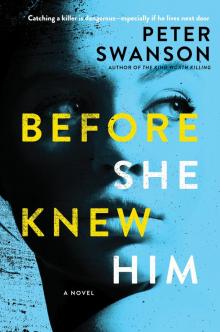 Before She Knew Him
Before She Knew Him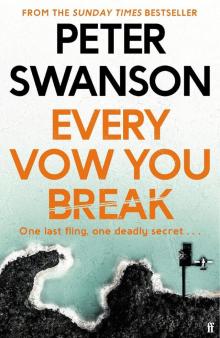 Every Vow You Break
Every Vow You Break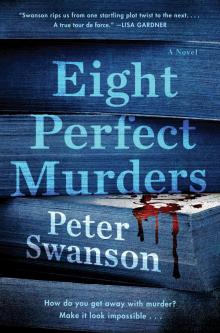 Eight Perfect Murders
Eight Perfect Murders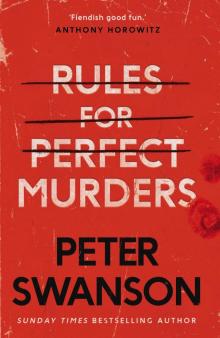 Rules for Perfect Murders
Rules for Perfect Murders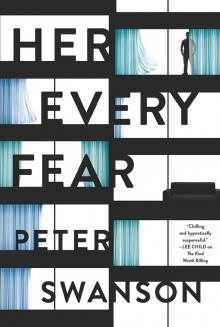 Her Every Fear
Her Every Fear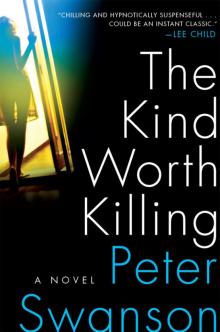 The Kind Worth Killing
The Kind Worth Killing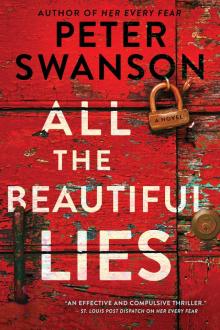 All the Beautiful Lies
All the Beautiful Lies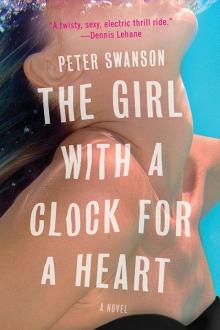 The Girl with a Clock for a Heart: A Novel
The Girl with a Clock for a Heart: A Novel